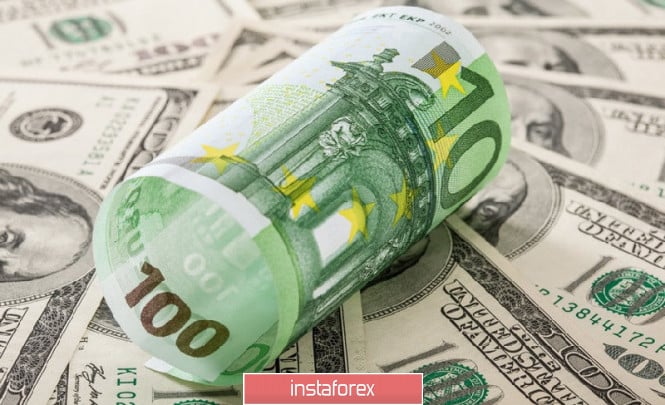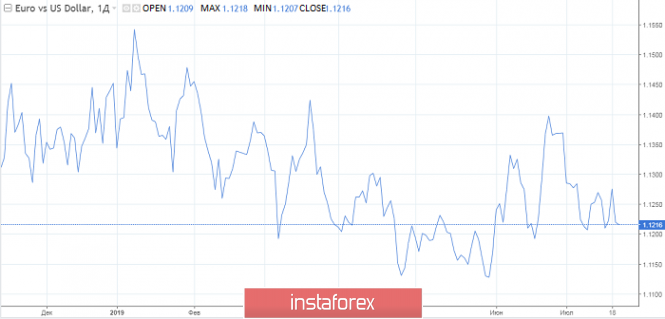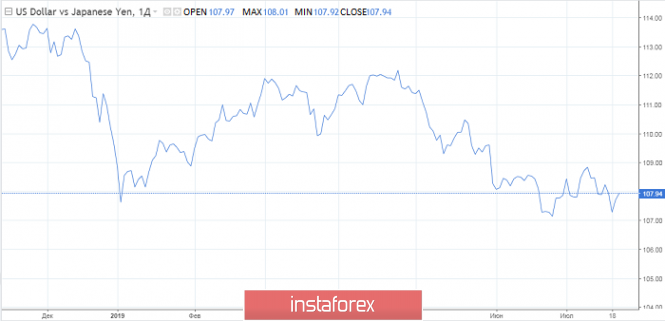
Attention in the foreign exchange markets is focused on the world central banks' decisions on rates. This week, traders have switched to the eurozone and its economy looks bleak. If the Fed wants to act proactively, the ECB, perhaps, cannot do without this measure. Under the influence of weak external demand, the German economy may slow growth this year to 0.5%. Inflation in Europe, despite a large-scale stimulus, is not able to exceed the level of 1.3%. The ECB, meanwhile, constantly cuts GDP estimates in the region.
Many Bloomberg respondents believe that the European regulator at the July meeting will signal the easing of monetary policy in September. Representatives of UBS, HSBC and Nomura are waiting for the second rate cut on deposits in December, and analysts at Commerzbank saw an opportunity to cut it by 20 bp this week. It should be noted that this bank is not alone in its opinion. The probability of reducing the cost of funds raised at the upcoming meeting of the Governing Council exceeded 50%, whereas a month ago it was about 25%.
Market expectations of Mario Draghi's "dovish" rhetoric are extremely high and can provoke a rebound in the euro on the facts. When most of the "bearish" drivers are already taken into account in the value of the currency, a sharp leap is catching newbies unawares, while professional participants are not surprised. Drawing attention to the ratio of premiums between options for the purchase and sale of the single currency, it can be understood that the number of bulls in the market is gradually increasing.

It is possible that on the expectations of signals from Draghi, sellers of the EUR/USD pair will try to test support at the level of $1.12. However, traders need to brace for the fact that this time EUR/USD will also ride on a roller coaster. In short, the week for the main pair promises to be complex and extremely volatile.
I must say that just a day before the ECB meeting, the sale of the euro may increase. Such a movement will contribute unfavorable reports on activity in the services sector and the production of the region. The new batch of weak statistics is expected to be another proof that the eurozone economy cannot do without new incentives.
It is worth noting that the proximity of the FOMC meeting at the end of this month could keep the euro from a strong decline.
What will the Fed say?
The chances of a strong easing of the Fed policy are rather weak, but there still are. Fed as a preventive measure will reduce rates by a quarter percentage point. By the more courageous actions that traders are waiting for, the US central bank is hardly ready. In addition, now there is no need to cut rates by 50 bp, as the latest data does not signal a sharp decline in the US economy.
A low profile is taken into account in the quotes, so do not expect a strong weakening of the dollar. Traders will carefully study the text of the accompanying statement in order to understand further plans regarding US rates.
The Fed's position is not only interesting to participants of financial markets, but also the ECB. European financiers will probably want to listen to American ones before deciding to resume the quantitative easing program and lower interest rates.
If the members of the European regulator decide on some measures, this will happen not in July, but in September. In this regard, the focus of the market on Thursday will be sent to the press conference of the ECB. In previous periods, the comments of Mario Draghi, voiced after the meeting, moved the euro by 3% or more in a short time.
Will the Bank of Japan follow its colleagues?
The Bank of Japan's target inflation is 2%, However, so far this level can only be dreamed of. In June, the figure was exactly the same as a year ago - 0.7%. The regulator may well begin to reflect on the rate cut, as has already been done by his colleagues from the APR - Australia, India, Indonesia and South Korea.
On Monday, Japanese Prime Minister Shinzo Abe declared his readiness to take all necessary measures, flexibly and without hesitation, if the situation requires. The risks to the Japanese export-dependent economy are increasing. The slowdown in China's GDP growth, its trade war with the United States and the spread of protectionism led to the seventh monthly drop in Japanese exports and a weakening of industry.
"There is still uncertainty about the prospects for the global economy, such as trade friction and the exit of the UK from the European Union. We will not hesitate to respond to the risks associated with a fall, and we will take flexible and all possible steps. If necessary, the cabinet will take more aggressive and bolder economic measures than ever, " said Abe at a press conference after his ruling coalition retained a solid majority in the elections to the upper house.
Most analysts believe that the Bank of Japan will not take emergency measures yet, which cannot be said about the Fed. In this situation, the USD/JPY pair can not only descend to the horizon of 106.75, but, breaking through it, rush to the low of the beginning of the year - 105.

